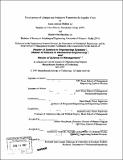Development of a design and evaluation framework for supplier cities
Author(s)
Mellein, Jason Antoine; Shockley, Daniel Allen
DownloadFull printable version (6.586Mb)
Other Contributors
Leaders for Manufacturing Program.
Advisor
David Hardt and Richard Locke.
Terms of use
Metadata
Show full item recordAbstract
For companies pursuing opportunities by expanding manufacturing to new markets, one major challenge is unavoidable: identifying and developing capable, local suppliers. In developing markets suppliers often lack the cutting edge technology, processes, and management methodologies driving the world's best businesses. The ability to identify and develop, relocate or build suppliers with World-Class capability becomes a competitive advantage. This thesis discusses the state of the art in Industrial Conglomerations (including Industrial Clusters and Supplier Cities) as well as their benefits and limitations. To analyze the potential opportunity for manufacturing firms considering supplier cities, we have developed a technical, operational, and financial framework for considering the opportunity and making key decisions about structure, location, and included processes. The framework includes a discussion regarding process selection based on an analysis of critical technical issues at each manufacturing step. This analysis considers the relationship of process capability to overall product performance and ultimately to product competitiveness. (cont.) In an attempt to help justify the effort of the host company in establishing a Supplier City, we include a discussion of the cost model we developed to quantify the benefits associated with supply chain expense, learning curve effects, and the expense of developing suppliers located in Supplier City versus those located elsewhere. We further discuss the legal, political, social and environment risks of Supplier City and guidelines for stakeholder focused management of local, regional and national governments, party officials, and NGO's. Finally, we include a case study in which we apply our framework to The Timken Company's China operations. We discuss their specific case and our recommendations.
Description
Thesis (S.M.)--Massachusetts Institute of Technology, Engineering Systems Division; and, (S.M.) -- Massachusetts Institute of Technology, Sloan School of Management; in conjunction with the Leaders for Manufacturing Program at MIT, 2007 [first author]; and, (S.M.)--Massachusetts Institute of Technology, Dept. of Mechanical Engineering; and, (S.M.) -- Massachusetts Institute of Technology, Sloan School of Management; in conjunction with the Leaders for Manufacturing Program at MIT, 2007 [second author]. Includes bibliographical references (p. 77-79).
Date issued
2007Department
Leaders for Manufacturing Program at MIT; Massachusetts Institute of Technology. Department of Mechanical Engineering; Massachusetts Institute of Technology. Engineering Systems Division; Sloan School of ManagementPublisher
Massachusetts Institute of Technology
Keywords
Engineering Systems Division., Mechanical Engineering., Sloan School of Management., Leaders for Manufacturing Program.